The fact of the matter is that humanity is only guessing what it thinks which Socio-political idea is best in terms of relative stability, relative growth and relative longevity. We must use the word "relative" because humanity doesn't even know if these three terms are best for it in describing what is best for it. No less, humanity is only guessing which religion, philosophy, music, nutrition, science, art, etc., is best. They are all theories. While some may claim this or that idea "works", there are many things that 'work', such as a dictatorship, monarchy, slavery, war, crime, economics, sports strategy, military strategy, etc., but this doesn't mean they work best if placed side by side all alternatives... or that we even know all the alternatives. Take for example the comparison between an early automobile and those of today... and perhaps the future, that were included in the previous page within a discussion of Capitalism.
 |
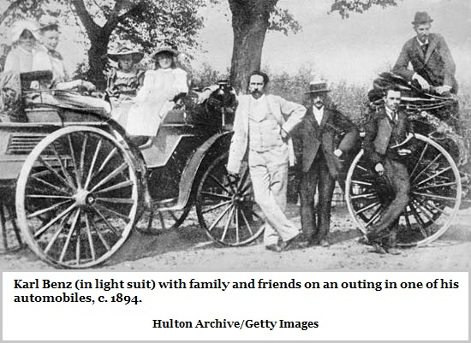 |
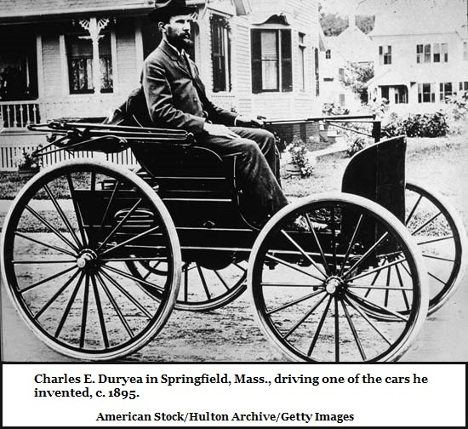 |
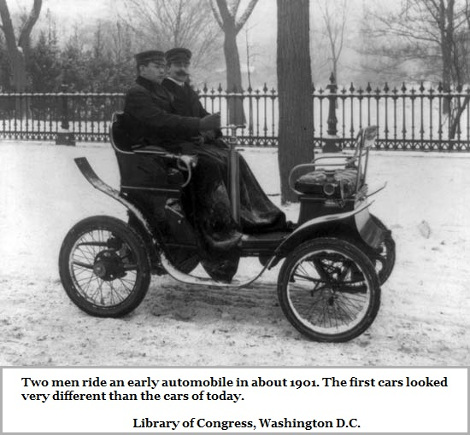 |
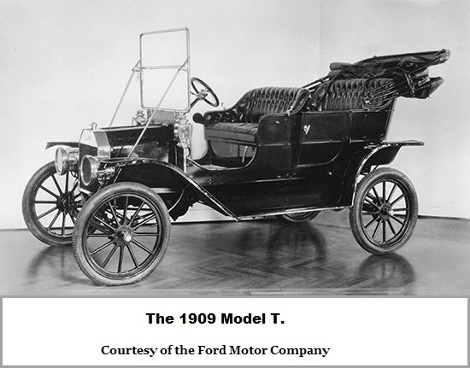 |
 |
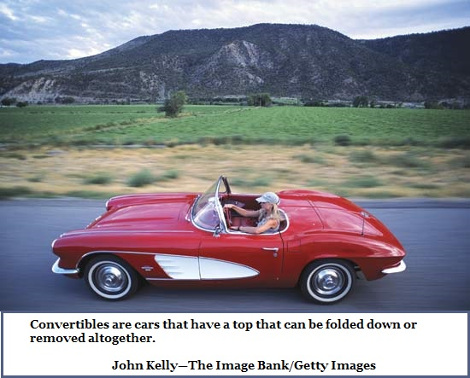 |
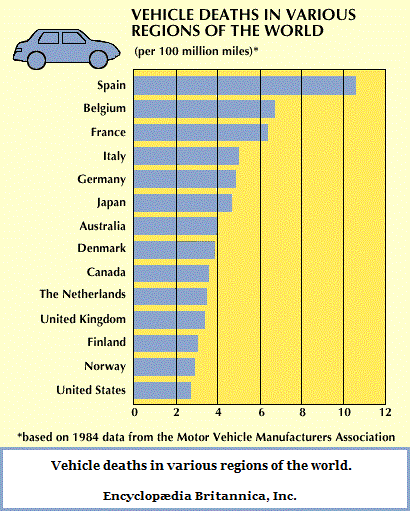 (Developmental Progression to higher rates of death) |
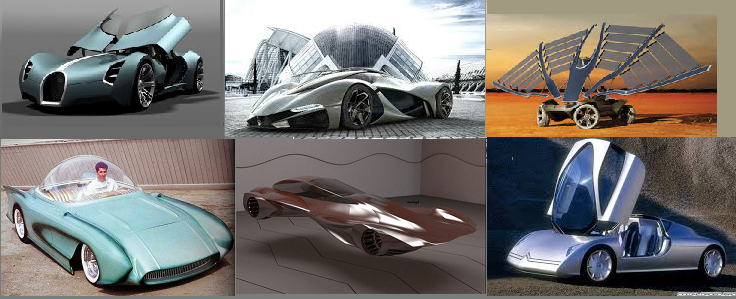 | |
 (Many sequences of development exhibit a pattern-of-three. See Threesology Research Journal for other examples via the many pages in the contents sections.) |
|
While we of today may prefer to have a vehicle that is manufactured today because of all the indulgent luxuries (heater, air conditioning, speed, comfort, electronics...), in terms of efficiency, the internal gasoline combustion engine is not particularly efficient. In fact, it is quite wasteful because most of the energy is lost in the exhaust as heat. Though attempts to capture some of the energy is made by the usage of turbo-chargers and the Diesel fuel internal combustion engines are more efficient due to increases in compression ratio, the usage of fuel injection instead of spark ignition systems and ... not to mention the usage of turbo-chargers (and sometimes after-coolers) as a standard feature, they too are not particularly efficient. In other words, though we claim these engines "work", they actually don't 'work' well in terms of using resources very efficient for humanity. And like all the political theories which "work", which one actually is best? Most of the engines in usage are dirty pollution machines (despite pollution controls) and they use oil products inefficiently... not to mention creating deaths and piles of junk.
Nonetheless, we design our societies around vehicles and vehicle service industries. Yet, if we got rid of all vehicles and the usage of all internal combustion engines, would we have a better society? Would there be better equality than letting everyone have their own vehicle... though some vehicles are clearly less efficient than others? Is Equality what humanity should be seeking? Speaking of which, if we look at the typical life-style of most people, it is not one in which they are seeking equality. Most are trying to get a better job, a nicer home, nicer clothes, better physique through exercise programs, more pay, more benefits, etc... So where is the equality? If everyone had the same pay, would there be equality? There couldn't be if we wanted everyone to live in the same kind of house in the same spot in the same country. Would we not have to clone everyone to make them all equal? Then again, would the clones who are "born" first, perceive themselves to be a big brother or big sister entitled to some commensurate recognition that represents an inequality from those clones which are "born" afterwards? Also, how can the people strive for equality if those in their government are seeking to enhance their personal status and define equality in terms of some entitlement that others don't have? The very fact that a person campaigns for a government position means they are not looking for equality, but a superior position that may be accompanied with the philosophy that they need to be in a superior social position in order to facilitate greater equality!... and they in turn may higher assistants who are to be viewed with having a superior position of employment whereby they too are no longer equal to the common person. So, how many people must have a superior form of equality in order for everyone else to have an equality of mediocrity?
If we were actually seeking to practice equality, would we not strive to create one type of car like having one type of god, or a monopoly on a given product instead of having so many different varieties like a soft drink dispensing machine whose offerings are owned by but a few business owners whose only interest in equality is to be able to insure they have a superior hold on a given market? Would we not be striving to produce clones... and yet, why produce clones of billions of people? Aren't "just enough" just enough? And because we don't— since we each seek for some measure of superiority that we want to define as equality in order not to appear different... though in reality we are, why don't we say that those who are striving for equality are actually those who think it will provide an opportunity for those who believe themselves or others are less equal? And how is it that we can measure inequality unless we practice some measure of it in our day to day evaluations of persons, places, and things? Those claiming the need for humanity to develop equality do so because they somehow imagine there are enough resources to be spread out and enjoyed equally amongst not only those living today, but all those of an increased population in the future. Will there be enough water for everyone in the future to wash clothes, bathe in, wash their cars, water their lawns, water their crops and animals, fill up their vehicle radiators... not to mention for cooking and drinking? Is there enough money for everyone living today to be shared equally? And does this equality mean all businesses and governments are to have the same amount of money and other resources? Will all religions, governments or people use the money in the same equal way? Will this "equal way of spending" be of benefit to all, or used to gamble, get drunk and buy sex? And when they run out of their equal share because they did not "equalize" spending their share in the same way as those who save their money, what then? Are we simply to collect all the money together again and divvy it up equally? How are we to define equality amongst a species that is not equal?
If those in government are enabled to dictate what they think is equality, are we not practicing a type of inequality because a few in government are permitted to select terms that the majority can not? If a military believes in equality, why does it seek military superiority? Why do governments seek to colonize and practice imperialism if they are interested in equality? Must equality be practiced by permitting a few to be unequal... and those few are unable to do anything about it? If religions speak of equality, why don't they practice it? Why is 'One' god superior to a belief in '100'? Isn't the value of 100 more than 1? Why have only 'one' unless it is a means of reducing the availability of a given intellectual product? Since the concept of god is a product, and by controlling the quantity thereof makes it easier to control people in order to maximize their energies for a selective purpose of belief, is this not a commercialization of god? Is this equality? Why don't all religions create one world religion and thereby "corner the market" for all religions... if not spirituality? Why not monopolize all of humanity under one name brand religion?
Is equality to be qualified as "sameness"? And how are we to define this 'sameness'? By generalities or specificities? Do we say that a person living in a cardboard box is the same as someone living in a mansion? Or how about someone living in a mansion valued at a billion as opposed to one valued at a million dollars? Is the value of a ripe, over-ripe, rotten piece of fruit to be viewed as being equal because they are fruit? And if someone prefers vegetables over fruit, how are we to determine equivalency? Based on the cost of production (planting, watering, fertilizer, harvesting, transporting, etc...) or the amount of fuel they provide the human body? And what if someone's preference fails to grow or becomes diseased? Is there an equivalent? What if a person doesn't want any substitute? Do we force them to choose what they perceive to be an unequal situation? By whose standards of equality should we use? Is the equality spoke of by one socio-political theory actually superior to that of another? Then were is the equality in the perspective of such a superiority? While one religion may speak of equality in that it welcomes other denominations of religious belief to be practiced, is this equality or an act for ensuring the belief in a single god... which they espouse... and do not what people to practice a belief which is perceived to be a threat to their one-god belief?
Where is the practice of equality by those democracies that use a military to enforce the subjugation of a people so that it can take their resources? Where is the equality in the concept of imminent domain, where "market value" of a property may be at a depressed value because the government created conditions that would produce a devaluation so that it could purchase a piece of property for less than its worth in a time of prosperity, which will occur after the government gets the property and can then sell or lease it for a profit? Where is the equality in such underhanded antics of business? There is no equality... unless one thinks that the parity between nations is more important than the parity between citizens.
Where is the equality in education if one's interest is in getting a degree in a certain subject area because of the assumed potential it will provide for a lucrative life-style? How is it that we will judge equality by what vehicle each of us has, yet the very fact of operating a vehicle is both harmful to the environment and to ourselves? How is this supposed to be an example of equality when the presumed results of one equality that is gained results in some other inequality in the near or distant future? Let us look at the attempt to distribute equality through wood products and machine usage which result in pollution from deforestation, the burning of fossil fuels and other industries striving to promote some measure of providing an equality of service:

Is equality to be defined by how much illness we can produce in everyone? That if everyone dies of the same disease(s) we have achieved a desirable equality? Is equality to be defined by everyone "having a job" even if the jobs pay different wages, benefits and requires different amounts of time? Is it equal if a person is forced to work 12 hours a day at 12 dollars and hour and another is required to work 8 hours per day at 12 dollars an hour? Is equal pay an indication of overall equality? Whereas we can have the equality of a "right to work," this is not the same as a "right to employment". If the government was truly interested in everyone being economically equal, it wouldn't vote itself in a raise or cost of living allowance without the equal assent of the people. By the very fact that an Electoral College, gerrymandering, high campaign costs, etc... are used, means the government has not real interest in equality. It wants the people to think that it does, whereby if everyone believes in this nonsense they are equal in this respect of believing in a sham.
There is the old idea that Henry Ford exclaimed that "History is Bunk"... when he could have just as easily said that "Equality is Bunk"... since it is a utopian ideal meant to be used as a social narcotic that appeases the masses that are easily duped and swayed by a collective consciousness of some illusion. The idea of a Utopia, no matter how well one's words are used to conceal such as the underlying objective, is particularly naive when one recognizes that any attempt to create a presumed Utopia in an unstable (expanding) Universe wherein one of many different galaxies exist which may house any number of sentient beings that have no interest in such a concept and prefer to live for the moment or for their specific period of life... not to mention that the Sun of our Solar system is burning out, the Moon is receding (affecting tidal behavior) and the rotation of the Earth is slowing (altering the electro-magnetic gyro). Unless we think of a "Utopia" as some sort of relative equilibrium that maintains itself in the processes of ongoing decay, then the idea of a "Utopia" as some lasting forever Heaven on Earth is particularly incongruous with the facts of Nature and clearly suggests one is indulging in a child-like fantasy typical of neurotics and psychotics when they are experienced by adults. However, let us take a review of this idea called "Utopia" as described in a Britannica article:
Utopia: an ideal commonwealth whose inhabitants exist under seemingly perfect conditions. Hence “utopian” and “utopianism” are words used to denote visionary reform that tends to be impossibly idealistic. More's Utopia: 
The word first occurred in Sir Thomas More's Utopia, published in Latin as Libellus . . . de optimo reipublicae statu, deque nova insula Utopia ("Concerning the highest state of the republic and the new island Utopia"; 1516); it was compounded by More from the Greek words for "not" (ou) and "place" (topos) and thus meant "nowhere." During his embassy to Flanders in 1515, More wrote Book II of Utopia, describing a pagan and communist city-state in which the institutions and policies were entirely governed by reason. The order and dignity of such a state was intended to provide a notable contrast with the unreasonable polity of Christian Europe, divided by self-interest and greed for power and riches, which More then described in Book I, written in England in 1516. The description of Utopia is put in the mouth of a mysterious traveller, Raphael Hythloday, in support of his argument that communism is the only cure against egoism in private and public life. More, in the dialogue, speaks in favour of mitigation of evil rather than cure, human nature being fallible. The reader is thus left guessing as to which parts of the brilliant jeu d'esprit (A witty comment or writing) are seriously intended and which are mere paradox. Speculative and practical utopias: Written utopias may be speculative, practical, or satirical. Utopias are far older than their name. Plato's Republic was the model of many, from More to H.G. Wells. A utopian island occurs in the Sacred History of Euhemerus (flourished 300 BC), and Plutarch's life of Lycurgus describes a utopian Sparta. The legend of Atlantis inspired many utopian myths; but explorations in the 15th century permitted more realistic settings, and Sir Thomas More associated Utopia with Amerigo Vespucci. Other utopias that were similar to More's in Humanist themes were the I mondi (1552) of Antonio Francesco Doni and La città felice (1553) of Francesco Patrizi. An early practical utopia was the comprehensive La città del sole (written c. 1602) of Tommaso Campanella. Francis Bacon's New Atlantis (published 1627) was practical in its scientific program but speculative concerning philosophy and religion. Christian utopian commonwealths were described in Antangil (1616) by "I.D.M.," Christianopolis (1619) by Johann Valentin Andreae, and Novae Solymae libri sex (1648) by Samuel Gott. Puritanism produced many literary utopias, both religious and secular, notably, The Law of Freedom . . . (1652), in which Gerrard Winstanley advocated the principles of the Diggers. The Common-Wealth of Oceana (1656) by James Harrington argued for the distribution of land as the condition of popular independence. In France such works as Gabriel de Foigny's Terre australe connue (1676) preached liberty. François Fénelon's Télémaque (1699) contained utopian episodes extolling the simple life. L'An 2440 by Louis-Sébastien Mercier (1770; Eng. trans., 1772) anticipated Revolutionary doctrines. G.A. Ellis' New Britain (1820) and Étienne Cabet's Voyage en Icarie (1840) were related to experimental communities in the United States that revealed the limitations of purely economic planning. Consequently, Bulwer-Lytton, in The Coming Race (1871), invented an essence that eliminated economics altogether, and William Morris demonstrated his contempt for economics in News from Nowhere (1890). Two influential utopias, however, had an economic basis: Looking Backward, 2000–1887 (1888) by Edward Bellamy and Freiland (1890; A Visit to Freeland . . . , 1894) by Theodor Herzka. H.G. Wells, in A Modern Utopia (1905), returned to speculation. Satirical and dystopian works 
Many utopias are satires that ridicule existent conditions rather than offering practical solutions for them. In this class are Swift's Gulliver's Travels (1726) and Samuel Butler's Erewhon (1872). In the 20th century, when the possibility of a planned society became too imminent, a number of bitterly anti-utopian, or dystopian, novels appeared. Among these are The Iron Heel (1907) by Jack London, My (1924; We, 1925) by Yevgeny Zamyatin, Brave New World (1932) by Aldous Huxley, and Nineteen Eighty-four (1949) by George Orwell. The Story of Utopias (1922) by Lewis Mumford is an excellent survey. Utopian communities Concurrent with the literature, there have also been many attempts by religious groups and political reformers to establish utopian communities, especially in the Americas. In the two centuries between 1663 (when some Dutch Mennonites established the first such communitarian colony in what is now Lewes, Delaware) and 1858, some 138 settlements were begun in North America. The first to outlast the lifetime of its founder was the Ephrata Community established in Pennsylvania in 1732 by some German Pietists. Other German Pietist settlements were founded by George Rapp (Harmony in Pennsylvania, Harmony [or Harmonie] in Indiana, and Economy in Pennsylvania), by the Amana group (in Iowa), and by the Shakers (18 villages in eight states). Some of them pursued celibacy. Other communal religious sects still flourish; among the largest are the Hutterites, chiefly in the United States and Canada but having colonies also in Paraguay and England. One of the first secular communities was New Harmony, founded in 1825 when the British manufacturer Robert Owen purchased Harmony, Indiana, from the Rappites. It was a cooperative rather than communist society. Although it foundered, it sponsored the first kindergarten, the first trade school, the first free library, and the first community-supported public school in the United States. The ideas of the French social reformer Charles Fourier had a strong influence upon American reformers in the 1840s, particularly upon the leaders of Brook Farm in Massachusetts. Between 1841 and 1859, about 28 Fourierist colonies were established in the United States. The Icarians, followers of Cabet, established ill-fated communities in Illinois (Nauvoo, formerly settled by Mormons), Missouri, Iowa, and California. A unique venture was the Oneida Community founded in Putney, Vermont, by John Humphrey Noyes in 1841 and moved to Oneida, New York, in 1848. The group practiced "complex marriage," in which all husbands and wives were shared. Noyes said that Oneida was the continuation of Brook Farm without its mistakes. He was convinced that socialism was impossible without religion, and that the "extended" family system would dissolve selfishness and demonstrate the practicality of this way of life. Children remained with their mothers until they could walk but were then placed in a common nursery. After the American Civil War the enthusiasm for secular utopian experiments waned. There were some new settlements in the 1890s, following the publication of such Utopian tracts as Laurence Gronlund's The Coöperative Commonwealth (1884) and Bellamy's Looking Backward, but the impulse had run its course and these latter movements were soon gathered into the fold of political socialism. The creation of utopian religious communities continued into the 20th century, but they too were usually short-lived. The religious colonies, in almost all instances, were established and maintained by a single powerful personality who was believed by his disciples to have a singular gift of prophecy or wisdom. Most of these colonies flourished during the lifetime of the original leader and then declined slowly after his death. Source: "utopia." Encyclopædia Britannica Ultimate Reference Suite, 2013. |
Of interest in the foregoing was the mention of "limitation" though it referred primarily to limitations in economic planning. If we broaden the application of "limitation" to a generalized accountability of human thought processing we find that there is an imposed limitation on how humans collate their ideas with respect to pattern recognition. In other words, though there is an endless supply of numbers, we humans tend to use only a small percentage thereof and that the basic assemblage of numbers themselves is a repetition of 10 symbols... not to mention the usage of a three-patterned grouping sequence to distinguish three- placements followed by a comma such as ones-tens-hundreds (comma) thousands... etc... While it may not be customary of those who think about Utopic settings or other socio-political-economic theories to think about basic cognitive activity, it is necessary to do so because identified limitations of a given practice entail the application and usage of such limitations. For example, many of us use number words or symbols to portray grouping sequences and those grouping sequences fairly regularly exhibit some low number pattern involving the first 10 digits (0123456789), and then a few others containing some combination thereof such as "12" or "dozen", "13" or "thirteen" "144" or "gross", etc... If we were to make a collection of such patterns involving every subject... every interest, we will have compiled only a small handful of all the available number patterns available for usage.
This limitation... this conservation of number usage, suggests we are being subjected to pressures which force this effect on us. Let us speculate that we are thus limited because the environment does not require us to use most of the number patterns for survival. This may be the result of living on the "3rd" planet from a source of solar energy and having been biologically developed from a genetic functionality involving a triplet coding system such as that found in DNA and RNA. No less, most people appear to hold a pen or pencil with three fingers, end a sentence with one of three punctuation marks (period, question mark, exclamation point), choose from one of three types of gasoline grades (diesel is a fuel oil), and pursue one or more of the three standardized degrees from a college or University (Bachelors,Masters, PhD). This is why there are a large assortment of two-patterned ideas as well, and the first three numbers are part of a "limited economy" frequently found as a characteristic pattern in philosophy with different personalities such as (monad- dyad- triad), (Major premise- Minor premise- Conclusion); in physics (three fundamental large particles: electrons- neutrons- protons), music (musical triads), etc..., including the frequent occurrence of a three-to-one pattern such as the three cones and one rod configuration of the human eye.
While these few examples may hardly seem to offer "predominance of evidence" with respect to the idea of a cognitive limitation due to environmental influences, it provides a sign post to a door way for further examination: Threesology Research Journal. And even if you take the time to catalogue examples of patterns other than ones, twos, threes, fours, fives, sixes.... etc., you will eventually find that you have found a limitation and a repetition of just a few number patterns. As a window into the thinking processes of humanity, this is a tale-tale sign that any interest in any type of socio-political theory, including Utopianism, is the practice of limitations... economic and otherwise. But not only limitations, but of an effort to maintain some semblance of equilibrium in a deteriorating planetary environment that humanity can't do anything about because it doesn't have enough knowledge or the technology to keep the Sun from burning out, the Earth's rotation from slowing and keep the Moon from receding... much less keep the Universe from expanding... if at all it should.
Trying to implement a Utopian-like socio-political community (that uses pre or post-civilized communal activities called animalistically natural or naturally artificialized) with or without a conventional type of economics under conditions of decay will require a life-style that maintains its relative equilibrium in-concert with the decay, which may also require that the inhabitants of such... decay right along with it. Equality would thus be defined as a similar type and level of experienced deterioration. A lessening of community morals, an increase in divorce rates, increased appearances of lesbianism, homo-sexuality, transvestism, bestiality, pornography, self-mutilation (tattoos, body piercing, addiction), incapacitating self-absorption, corporate and government theft with or without collateral damage, mental illness, genetic malformations, parental abuse of children, etc., may be expressions of an attempt by humanity to maintain some semblance of equilibrium with ongoing deteriorating environmental circumstances by embracing deteriorations within its prevailing social functions... functions which include a deterioration in government activities with other nations and its own citizens.
Prevailing government activities will continue to deteriorate with an increased communication amongst the citizenry that can share ideas within seconds due to increased forms of available transmission, and offer alternatives to those ideas being offered by government officials who are neither smart nor experienced enough to over-shadow the public consciousness that it was capable of doing prior to the advent of the internet and cellphone eras because by the time a better idea surfaced amongst the people, the government would have already put a policy into play that more often then not merely (metaphorically speaking) moved chess pieces around in social circumstances to give the impression of handling a social problem... when in effect, it provided a breathing or pause period whereby that which may have been causing a problem comes to be dissipated, dislodged or diffused into negligibility... but does not now significantly assist in rendering undesirable circumstances into inconsequential social episodes because of increasing social complexities. In fact, the increased level of information being provided by the public will be discounted in one way or another in order to be ignored so that it can be used at a later time which permits one or more in the government to take the information and apply it to some personal interest that is claimed to be a self-generated formulation, though someone in the public devised a given idea and was not given credit for it. At the time of being publicly offered as a truth, is was defined as being crass and non-politically correct because it wasn't though of by someone in government since the quality of talent and intellect therein is deteriorating because the system which calls for them to enter into it, is likewise part of an ongoing deterioration the people need to sorely free themselves of.
However, in pointing out examples of possible deteriorations involving behavior that some interpret to be an expression of freedom and liberty, we are confronted with situations involving extremes defined as central positions or Conservativism. Hence, along with the word "limitation" we should note the word "Conservative" as a corollary to the word "conservation" which has already been mentioned. While Lesbians and Homosexuals may view themselves as living an alternative lifestyle, it is only extreme from the perspective of those who are extreme in their Conservativism... and will thus create an entire philosophy supporting their own perspective... citing this or that from nature, history and whatever subject they can arrange to adopt as a positive construct to their respective orientation... though they are not necessarily willing to consider their activities as expressions of a deteriorating environment and that for whatever reason(s) they are particularly more susceptible to the deterioration(s). Yet, this also does not mean that everyone will be susceptible to the planetary deteriorations (which include those that are human-designed), in the same way. In other words, just because some people express their responses to environmental/social deteriorations by way of "alternative" sexual orientations doesn't mean everybody will. Some may respond by some addiction, criminal behavior, or any number of activities that may or may not be viewed as socially acceptable today, though they were not in some past age. Then again, if one attempts to think in terms of some ancient perfect state of humanity in which there were no signs of any deterioration, one might refer to a religious or philosophical conjecture such as the Garden of Eden or other pre-society circumstance.
With respect to all socio-political ideas, one must consider the possibility that all of them represent an effort to address both realized and unrealized circumstances of perceived deterioration... and all of them may be wide of the mark because they are an expression of the underlying problem themselves. Nonetheless, let us choose one that incorporates a means by which the people are fully enfranchised in the entire political process and are enabled to exercise Self-Representation and Self-Determination. As it stands, all of the prevailing socio-political ideas ostracizes the main body of citizens. The following chart is Representative of different socio-political ideas which do not incorporate a Peoples Legislative Branch and reflect different ideas of excluding the majority from the overall political and economic decisions making.
Without a Peoples Legislative Branch, the people will always remain politically ostracized. The Peoples Legislative Branch is a solution to the problem of having a Direct-Democracy within a large population so as to politically enfranchise the public.
| America's Political Guild System (a few examples of different flavors of peasant-citizenship to choose from) | ||
| Major Merchants (Reigning Political Aristocracies with individualized hierarchies) |
Product they are selling | Cultural Result |
| Democrats | Despotic formula of disproportioned Representative Democracy | Citizens are exploited as politically ostracized peasants (Triple-standard law: politicians, rich, everyone else) |
| Republicans | Plutocratic-Aristocratic exploitive Democracy | Citizens are exploited as politically ostracized peasants (Triple-standard law: politicians, rich, everyone else) |
| Major Merchant (silent partner advocates) |
"Merchant" refers to anyone selling or trading any product be it food, water, money, sex, legislation, protection, advice, assistance, labor, education, knowledge, etc... It is not confined to historical definitions involving conventional commodities of goods or services. Attempts by some to distance themselves and their activities from the word "mechant," will not advantage themselves a means to be disincluded from the present list of examples. | |
| Corporations (with individualized hierarchies) (Includes minor-league major businesses such as insurance, entertainment, sports) |
Unrestrained Capitalism | Commercially addicted Peasant-Citizens politically ostracized dog-eat-dog, rich-versus-poor, commercialized criminality, "It's Nothing Personal, It's Just Business" exploitations (Triple-standard law: politicians, rich, everyone else) |
| Law Enforcement (including court systems) (Federal and State Aristocracies exist) |
Despotic Formula of Deferent Democracy | Deferent Peasant-Citizen Adversarial Suspects politically ostracized (Triple-standard law: politicians, rich, everyone else) |
| Military (Aristocracy called ranking hierarchy) |
Despotic Communistic Socialism | Collaterally damaged Peasant-Citizen Automatons politically ostracized (quadruple-standard law: Military hierarchy, politicians, rich, everyone else) |
| Religion (Aristocracy called hierarchy) |
Despotic Socialistic Communism | Charitable, Penitent, Impoverished Peasant-Citizens politically ostracized (Triple-standard law: politicians, rich, everyone else) |
| University/College education (Aristocracy called Education hierarchy) |
Despotic Formula of varying governments | Disenchanted, Rebellious or obligingly deferent Peasant-Citizen Utopians (Triple-standard law: politicians, rich, everyone else) |
| Minor Merchants | ||
| Anarchy (Aristocracy not yet established) |
Despotic Free-For-All | Exploited Citizen-Peasants politically ostracized (dog-eat-dog, black marketeering) (Triple-standard law: politicians, rich, everyone else) |
| Communism (Aristocracy not yet established) |
Despotic Socialist Communitarianism | Indentured Peasant-Citizens politically ostracized (Triple-standard law: politicians, rich, everyone else) |
| Democratic-Socialism (Aristocracy not yet established) |
Despotic Formula of Representative Democratic-Socialism | Exploited Peasant-Citizens politically ostracized (Triple-standard law: politicians, rich, everyone else) |
| Libertarianism (Aristocracy not yet established) |
Despotic Formula of Representative Libertarianism | Exploited Peasant-Citizens politically ostracized (dog-eat-dog, black marketeering) (Triple-standard law: politicians, rich, everyone else) |
| Meritocracy (Aristocracy not yet established) |
Despotic Formula of Representative Meritocracy | Exploited Peasant-Citizens politically ostracized (Triple-standard law: politicians, rich, everyone else) |
| Socialism (Aristocracy not yet established) |
Despotic Formula of Democratic Communism | Indentured Peasant-Citizens politically ostracized (Triple-standard law: politicians, rich, everyone else) |
| Negligible Merchants (Politically Disenfranchised- Differentiated hierarchies based on protest prominence) |
||
| Citizens (part time, full time and illegal aliens) |
Labor, Patriotism, Self-Sacrifice | Citizens are exploited as politically ostracized peasants experiencing Indentured Servitude, inequality, guild dismemberment
(Hypothetical Single-standard law: Everyone should be treated equal) |
The people must achieve the benefit of a full membership status in the present guild system by being paid a full wage of their inalienable rights, or the people must strike against the entire political system. It is a labor issue in that the people labor and must pay dues (taxes) to the current system of political guilds, but can have no say so in its operation to ensure their rights are fully addressed. While those who are young may well be viewed as apprentices, and those a little older with more experience viewed as Journeyman, but the majority have enough experience to be entitled to being recognized as a Master who should be given full status privileges which include sitting at the same table, with the same voting power as those in the political guilds. The Public guild system must demand its well-deserved guild status, or it must revolt to the extent of preventing the political guild system from being able to exercise any action against it.
Source for the above chart: Guild Organized Governments
For those who prefer an image:
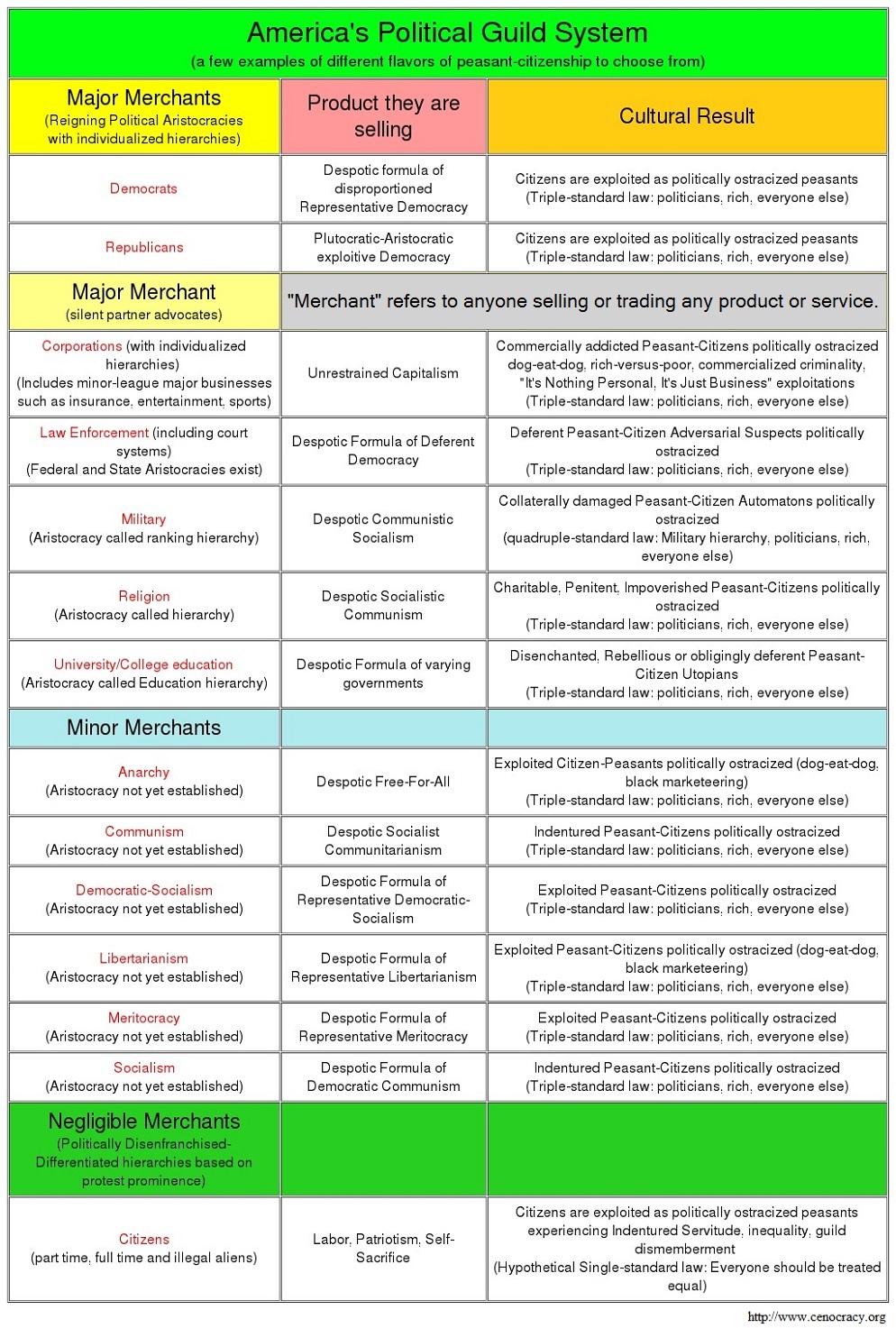
Date of Origination: Sunday, 6th-February-2018... 1:06 AM
Date of Initial Posting: Friday, 2nd-March-2018... 12:56 PM